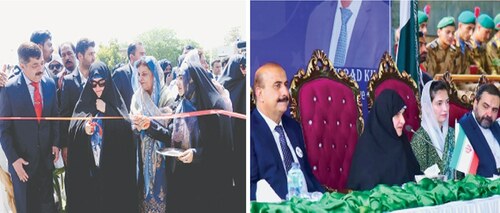Heated discussions on societal issues by experts on special occasions at seminars and forums are routine. They create public perceptions that may not represent the total picture, or reality.
On this International Women’s Day, Dawn talked to some ‘ordinary’ women about their experiences in the real world. Whatever grand plans the policymakers have introduced for their empowerment and betterment, life remains a struggle for the vast majority of the women of Pakistan.—Kalbe Ali
Bibi Jan has earned the reputation of a challenger, and a rebel against the cultural norms, by becoming the first custodian of a shrine (gaddi nasheen) in the Potohar region, if not the country.
Now she is a candidate for a reserved seat for women in the legislatures from the PPP.
She got the gaddi of Agha Pir Zaman Badshah, Badana, tehsil Gujar Khan after the male members showed no interest or did not measure up to the position.
“Back biting and false accusations are the first attacks on women in our society,” said Bibi Jan who triumphed in the face of threats and fierce opposition from her extended family that a woman cannot be the custodian of any shrine.
She said the male members of the family were disinterested in the position because the shrine had more to do with social work and none with raking in money from disciples.
She could establish her right to the gaddi because she is among the few custodians of shrines in the country who have studied spiritual sciences at Al Azhar, and at Qum, Iran.
She is now all set to battle in the political.
“They do not want a woman to be out and open among the political workers. But the community wants improvement and I have example of Benazir Bhutto to try to bring that about,” she said.
Surraya Kausar is least bothered about any international day, politics or even the climatic conditions. She has to be at her job especially on tough days because as a housemaid things cannot be taken for granted.
Abused, accused of various charges, overworked and underpaid, she faced the hardships of a brick-kiln worker in Sahiwal in the early stages of her life.
After her son was born, she persuaded her husband to move out of the mud-hole and go to Karachi in 1999 in the quest to have a better future.
While her husband managed to get meager earnings as a daily wage construction worker when they lived in Orangi Town Karachi, she could not find any work there.
“I cannot speak Urdu and the people there did not understand Punjabi, besides there area a lot of Bengali and Seraiki maids in Karachi,” she said. “But the worst part is that I am Christian.”
After convincing her husband, they moved to the federal capital where the couple established a hutment in G-7 slum area and she has been a housemaid working in Rawalpindi for more than a decade now.
Her children are studying in a private school in the locality where she works.
She explains proudly that her top priority is food for family and education for the children. At least they would not be brick-kiln workers.
Ghazala Noreen belongs to the middle class and the ranks of millions of working girls of the country - and faces the same problems they do.
Like them, she feels she is considered by her male colleagues less intelligent, slower and owing her job to “connections”, not merit.
“That is one big problem,” she says. “The men in our society have yet to appreciate that women are humans too.”
Ghazala comes from a well-off middle class family. Her father was a government officer in Multan. She took the bold decision - and convinced her family to allow her - to go to Islamabad for an internship programme.
“While I was embarking for Islamabad after graduating from Bahauddin Zakaria University, every wellwishers advised me to always carry a knife for security,” Ms Ghazala said.
“After spending some time in Islamabad I learnt that if I am upright and straight there is no serious threat from anybody,” she recalled.
Ghazala got a job in Wasa after her internship but later quit it and entered the fast lane of electronic media where, in the face of all odds and challenges she has managed to command respect of her male colleagues and get prime beats assigned by her channel.
She is since married to a colleague, a fellow Saraiki clan member, and has a son. Her mother takes care of the child while she works the maddening work of a television reporter.
Mrs Azra Azar is an M.Phil in special education, with major in deaf and dumb children. Born and educated in Rawalpindi, she moved to Jhelum after marriage where she took up a teaching job.
She was beginning to settle down in the job when she had to move back to Rawalpindi because her husband got a better job in a pharma company.
“Everyone would tell me that my first duty is towards my husband and my children,” she said.
“It is painful and frustrating to see all my hard work in attaining knowledge rotting. It wouldn’t have been harder, or impossible, to raise children and also hold a job for me, but that needed support from the in-laws.”
So she went for the second best option - use her speaking skills.
She became a Zakira narrating religious history and texts at majalis.
Mrs Azra is able to carry on this “social duty without neglecting my responsibilities as a wife, mother of three and a daughter-in-law”.
“It is normal that whenever there are guests in the house, or the maid is ill, all the responsibility falls on the housewife,” she said.
Her mother-in-law is not the traditional hard task master. In fact she complains, with a hint of pride, that her daughter-in-law is always busy and not taking care of herself.













































Dear visitor, the comments section is undergoing an overhaul and will return soon.